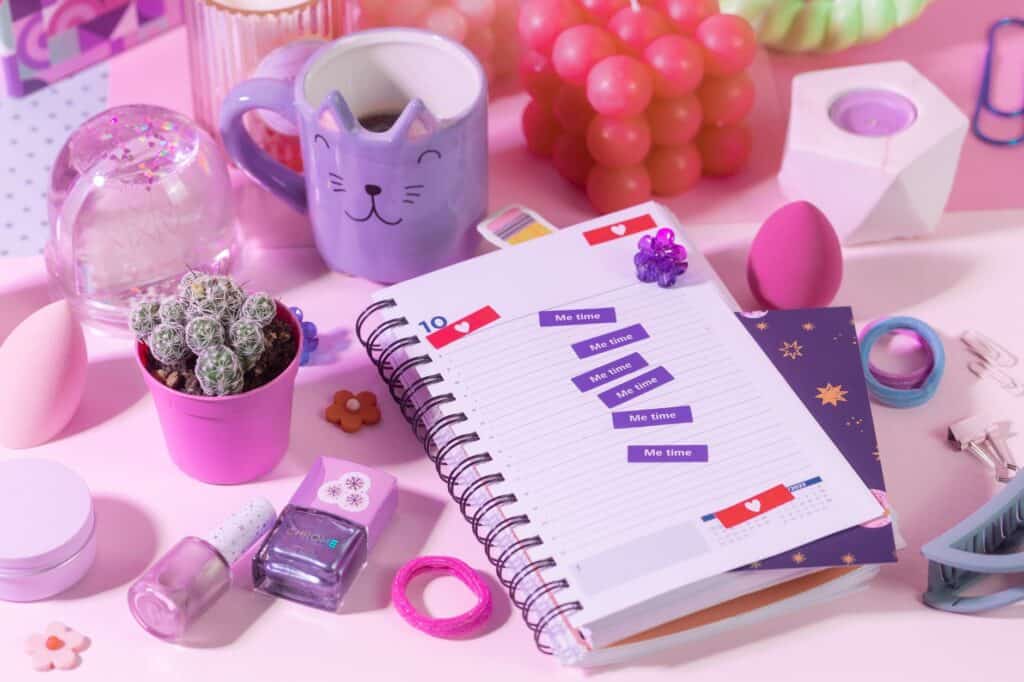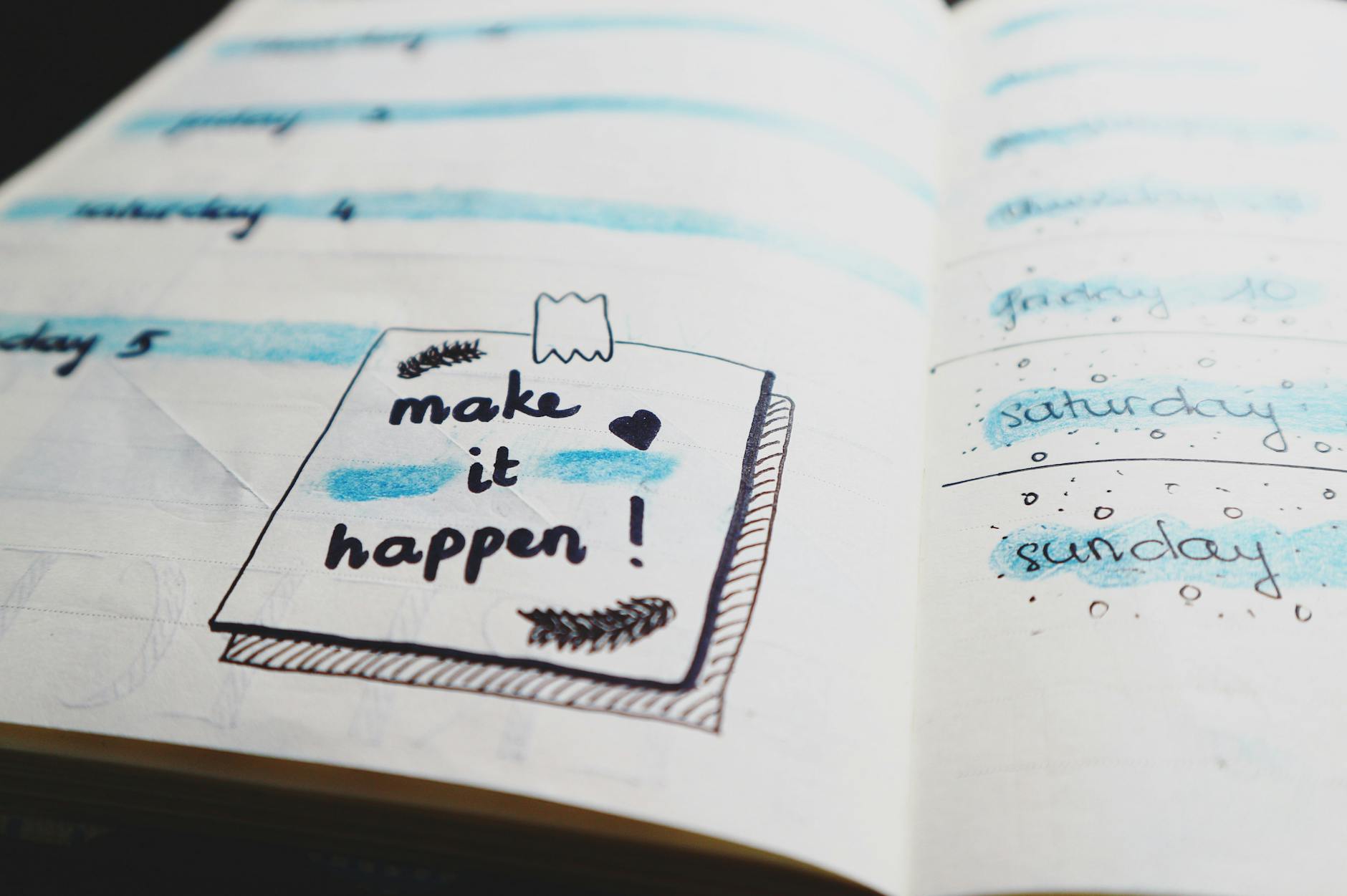Last updated on August 25th, 2025
Life feels like a whirlwind sometimes, doesn’t it? That’s where journaling comes in—a simple self-care habit with huge benefits. Writing your thoughts on paper helps clear your mind, reduce stress, and manage emotions better.
It’s like having a free, judgment-free therapist anytime you need it. Even if you’re feeling overwhelmed or just looking to better understand yourself, journaling can lift a surprising weight off your shoulders.
Why Journaling Matters for Self-Care
Journaling is a powerful self-care tool that can change how you feel, think, and grow.
Even if you’re venting frustrations or jotting down dreams, journaling helps you focus on your well-being every day.
Understanding Your Emotions
Imagine your emotions as a tangled ball of yarn. Journaling is like slowly unraveling those knots to see how each thread connects.
Writing down what you’re feeling allows you to recognize patterns in your moods and reactions.
Are you always stressed on Mondays? Does a certain event leave you feeling upbeat? Journaling helps you figure this out by giving you space to reflect.
This practice gives you a chance to name what you’re feeling. Whether it’s anger, sadness, or excitement, understanding your emotions makes them more manageable.
And this emotional clarity is good for your mental health and can improve relationships and decision-making too.
Reducing Stress and Anxiety
Ever had worries that just wouldn’t stop looping in your head? Journaling can break the cycle. It’s like emptying a heavy bucket of water – you feel lighter when it’s done.
Writing down your anxieties and stressors gets them out of your mind and onto paper, making them seem less overwhelming.
Sometimes seeing your fears written out can even make them less intimidating. Plus, it gives you room to brainstorm solutions or simply let it all out without judgment.
Studies have shown journaling reduces stress and lowers feelings of anxiety over time. Imagine freeing up some mental space for more positive, uplifting thoughts.
Photo by Antoni ShkrabaBoosting Self-Reflection
Journaling doesn’t just help with daily emotions—it helps you grow over time.
Through looking back at old entries, you can track progress in your personal growth or even notice what habits may be holding you back. It’s like watching a highlight reel of your inner life, but without the bias of memory.
When you practice self-reflection, you develop a stronger sense of who you are. It encourages discovering what truly matters to you. For example, do your entries show a passion for creativity or a love for connecting with friends? These written insights help pinpoint ways to live in line with your values.
Through putting your thoughts, feelings, and progress down on paper, you’re taking charge of your story—much like an author shaping a life worth living.
Different Types of Journaling for Self-Care
Journaling isn’t one-size-fits-all, and that’s the beauty of it. You can find a journaling style that matches your personality, goals, or mood. Each type serves a unique purpose, helping you care for your mental health in different ways. Let’s break it down.
Gratitude Journaling
Photo by Nathan J Hilton
Gratitude journaling involves focusing on what’s good in your life. Writing down a few things you’re grateful for each day might seem simple, but it’s powerful.
This practice isn’t just for those shiny, big wins—think tiny moments too, like a good laugh with a friend or a peaceful morning walk.
Why does it work? Studies show regular gratitude journaling helps improve sleep, reduces stress, and even boosts happiness. It’s like a gentle reminder to notice life’s small blessings.
Tips for getting started:
- Write three things you’re grateful for every day.
- Be specific; instead of “I’m grateful for today,” try “I’m grateful for the kind barista who made my morning.”
- Reflect on how these moments made you feel.
Bullet Journaling
If you’re all about structure or feel overwhelmed by chaos, bullet journaling can be a lifesaver. Picture it like your life’s personal assistant: it keeps chaotic thoughts organized in one place.
From to-do lists to habit trackers, this method helps you achieve mental clarity with minimal effort.
What makes it special? Bullet journaling is super flexible. You can design it the way you want—simple checkboxes for tasks or elaborate creative spreads. It’s not just about productivity either. It encourages mindfulness by helping you stay present and track priorities.
If you’ve ever wanted a system for setting goals while managing your emotions, bullet journaling may offer just what you need.
Ideas for customization:
- Use it to jot down daily affirmations or pep talks.
- Track habits like water intake, mood, or exercise.
- Keep all your appointments, goals, and journal notes in one spot.
Stream of Consciousness Writing
Feeling overwhelmed and unable to find the right words? Stream of consciousness is the ultimate “let it all out” journaling. Here, you just write—no rules, no editing, no judgment. Whatever pops into your head, put it on the page, even if it’s messy or repetitive.
This style mimics how your mind works, helping you clear mental clutter. Think of it like decluttering your thoughts the way you’d clean a messy closet. It’s therapeutic and helps you reach deeper emotions you might not normally address.
Try this exercise:
- Set a timer for ten minutes.
- Write nonstop without pausing to edit. Don’t worry about grammar or spelling.
- Read it back later to see what stands out—you might surprise yourself!
Each method of journaling offers its own way to refresh your mind and nurture your well-being. Even if you’re marking gratitude, organizing your world, or simply letting your flow of thoughts take over, there’s a journaling style waiting for you to explore.
Tips to Start Your Journaling Practice
Journaling isn’t just putting pen to paper; it’s creating a space for yourself. In this section, we’ll cover how to pick your journal, set up a routine, and make your journaling feel natural and easy.
Choosing the Right Journal
Photo by Anete Lusina
Your journal says a lot about your vibes. Are you fancy? Minimal? Practical? Here’s what to think about before grabbing one:
- Size matters: If you want to take it on the go, pick something pocket-sized. If you plan to write only at home, a larger journal can be more inviting.
- Blank or guided pages: Some people love the freedom of drawing on blank pages. Others enjoy guided layouts with prompts for structure.
- Durability: A sturdy cover matters if you’re carrying it everywhere and want to keep things neat.
Find a journal that feels like you. It may take a few tries to discover what fits, but that’s all part of the fun.
Setting a Routine
Building habits takes effort, but journaling doesn’t have to feel like a chore. It’s all about finding a groove that fits into your daily life:
- Pick the perfect time: Mornings can be great for setting intentions, while evenings are better for reflecting.
- Stay consistent: Even 5-10 minutes a day can make a difference.
- Tie it to something else: Journaling can follow coffee in the morning or signal “wind-down time” before bed.
Imagine it like brushing your teeth—but for your thoughts. The more you do it, the easier it becomes.
Finding Your Voice
Here’s something a lot of beginners wonder: Am I doing this wrong? The answer is an absolute no. Journaling has no rules. Scrap perfection.
- Write what feels easy: Brain dump everything in your head, whether it’s messy, random, or not important.
- Add your flair: Use doodles, stickers, or even different colors of ink to make your journal feel personal.
- Skip judgment: It doesn’t matter if the grammar isn’t perfect or if it’s just bullet points.
Imagine your journal like chatting with a friend—comfy, raw, and without judgment. If you’re ever stuck, start by describing your current surroundings or list three things you’re grateful for.
There’s no wrong way to show up for yourself on the page. The hardest part? Starting. But once you do, it becomes easier.
Prompts to Inspire Your Writing
In journaling, a simple prompt can be the spark that ignites thoughts you didn’t know were waiting. It’s like opening a new door to your mind, helping you uncover insights and emotions.
Prompts are fantastic tools whether you’re new to journaling or need fresh ways to stay inspired. Here’s how you can use them every day and also channel self-care at the same time.
Daily Reflection Prompts
Daily reflection prompts are great when you want to explore what happened during your day or dig into how you’re feeling. They give a starting point that keeps you on track without overthinking. Some prompts are like holding a mirror to your day, helping you gain clarity.
Here are some ideas:
- What’s one thing from today that made you smile?
- What challenges did you face, and how did you handle them?
- If today had a theme, what would it be?
- Write about a meaningful conversation or moment you had today.
- What’s one lesson you learned about yourself?
Using these consistently can help create habits for self-awareness and gratitude. For an even longer list of inspirations, check out our 800+ Journal Prompts to keep your days bright and structured!
Self-Care Focused Prompts
Sometimes, we don’t prioritize ourselves enough, and writing can actually shine a light on this. Self-care prompts are designed to put you first, allowing time for reflection on your needs and emotional health.
Here are some self-care starters:
- What’s one small thing I can do today to feel better?
- How have I been taking care of my mental health lately?
- Write about something that makes you feel calm and why it’s important.
- What would my ideal relaxation day look like?
- Make a list of things you’re proud of about yourself.
When you use prompts like these, you’re essentially giving your inner self the attention it deserves.
Photo by Bich Tran
Journaling is like feeding your mind with self-love. And when you let yourself write freely, prompted or otherwise, you’re gifting yourself meaningful moments of peace and clarity that ripple out into your daily life.
Embrace Journaling for a Better You
Journaling can be transformative if you’re aiming to boost self-awareness, manage stress, or focus on self-care. Let’s explore how journaling can bring positive change to your life.
Releasing Emotional Freedom
Writing lets you release emotions you might otherwise hold onto. Through putting pen to paper, you’re untangling mental knots—it’s like opening a lid to let out steam.
Think about it: has there ever been a time when you talked about an issue and felt lighter afterward? Journaling can create that same relief.
Photo by cottonbro studio
Strengthening Your Mental Well-Being
Journaling improves your mental health over time. Writing down your thoughts can help with better sleep, reduced anxiety, and an improved mood.
Building a Habit That Grows With You
The beauty of journaling is how customizable it is. Even if you’re focused on gratitude, goal-setting, or personal reflection, you can shape the practice to fit your lifestyle.
It’s like a friend who adapts to your every change and need. Try setting aside 5 minutes a day, and let the practice grow naturally from there.
When you embrace journaling, it’s not just about writing words—it’s about giving yourself the space to heal, grow, and thrive, one entry at a time.
Final Thoughts
Journaling combines the freedom to express yourself with the power of reflection. It’s a simple act with a profound impact on well-being.
Even if you’re addressing mental clutter, connecting with your emotions, or sparking creativity, committing to this habit can truly transform your self-care routine.
A great journal isn’t about perfection, but process. It’s more than just words on a page—it’s your mental sanctuary.
Start small, stay consistent, and let your journaling practice grow with you over time.






